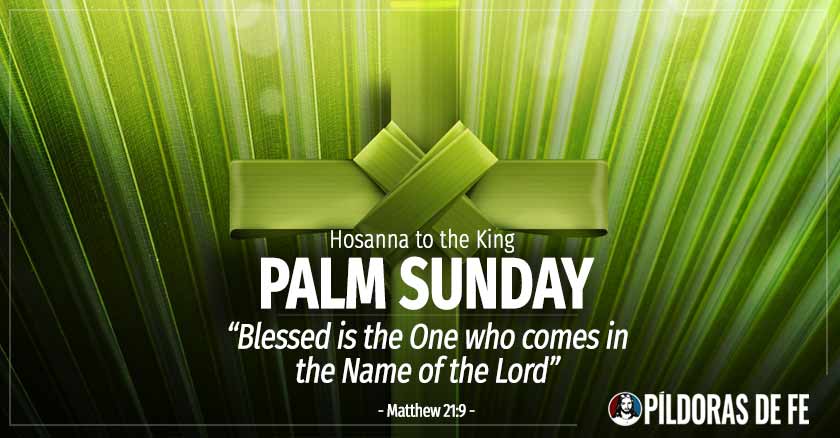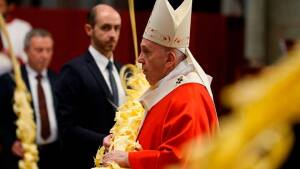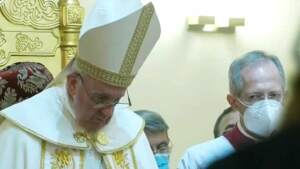Palm Sunday, also known as Passion Sunday, inaugurates Holy Week and commemorates Jesus´s triumphal entry into Jerusalem
Palm Sunday is a movable Christian holiday that falls on the Sunday before Easter. The feast commemorates Jesus´ triumphal entry into Jerusalem, an event mentioned in each of the four canonical Gospels
With Palm Sunday, or more correctly known as the Sunday of the Lord´s Passion, begins the solemn celebration of Holy Week, in which the last days of Jesus´ earthly life are remembered and celebrated, with great inner torments, physical suffering, the unjust trials, the ascent to Calvary, the crucifixion, death and burial, and finally his resurrection.
Roman Martyrology: Palm Sunday: Passion of our Lord Jesus Christ, in which, according to the prophecy of Zechariah, sitting on a donkey´s colt, Jesus entered Jerusalem at the moment when a large part of the public who approached him also praised him with songs and with palms in their hands received him joyfully
Palm Sunday tradition.
On Palm Sunday the Church celebrates the entry of Christ into Jerusalem to perform his Paschal Mystery. The four evangelists relate this event and underline its importance. Jesus is presented as the King-Messiah, who enters and takes possession of his city.
But Jesus does not enter as a warrior king who advances with his great army, but as a humble and meek Messiah, thus fulfilling the prophecy of Zechariah (9,9):
"Behold, your king comes to you; he is just and victorious, humble and. riding on an ass".
The Palm Sunday procession.
The characteristic of the procession is joy, joy that anticipates that of Easter. It is a procession in honor of Christ the King; that is why the vestments are red and hymns and acclamations to Christ are sung.
The Church carries out the events of the first Palm Sunday: what is read in the Gospel is lived immediately afterwards in the procession.
The procession is not mere ostentation, but something very real; in a sense, more real than the original event itself, because the Church, in celebrating this event with faith and devotion, celebrates the mystery that is hidden in it.
The king we acclaim on Palm Sunday and in our lives is not a historical figure, but the one who lives and reigns forever.
Jesus´s entrance to Jerusalem.
The meaning of Christ´s triumphal entry can only be perceived from faith. Jesus enters to carry out his messianic work, to suffer, die and rise.
"Blessed is he who comes in the name of the Lord; Hosanna in the highest!"
In every Eucharistic celebration we repeat this acclamation at the beginning of the Eucharistic prayer.
The coming of Christ in the Eucharistic mystery happens daily. In the Palm Sunday procession, the Church, represented in each liturgical assembly, goes out to receive and welcome Christ in a special way.
The procession conveys to us an anticipation of Easter Sunday. The joy and triumph of Easter thus breaks up the rather somber liturgy of Palm Sunday. The palms that are blessed and carried in procession are emblems of victory.
"Today we honor Christ, the triumphant king, by carrying these bouquets."
The Palm Sunday responsory sung upon entering the Church explicitly mentions the resurrection:
"As the Lord entered the holy city, the Hebrew children prophesied the resurrection of Christ."
In the Palm Sunday procession, the Church, besides commemorating a past event and celebrating a present reality, also anticipates its final fulfillment.
The Church awaits the full realization of the mystery at the end of time. This eschatological note is contained in the prayer that is said in the blessing of the branches:
"To all who will accompany Christ, acclaiming him with song, grant that we may enter the Jerusalem of heaven through him."
One of the laudatory petitions, addressed to Christ, also contains this longing for future fulfillment:
"You who went up to Jerusalem to suffer the Passion and thus enter into glory, lead your Church to the eternal Passover."
Liturgy of the word.
This Sunday is called in two ways: Palm Sunday and Passion Sunday. We pray for victory and passion for suffering. The procession is a herald of Easter victory; the liturgy of the word that follows it immerses us in the liturgy of Good Friday. Christ will indeed conquer, but he will do so through his passion and death.
The first reading is from the prophet Isaiah (50:74). The sufferings of the prophet in the hands of his enemies are a figure of those of Christ. His serene acceptance of insults and insults makes us think of Christ´s humility when he was subjected to even worse provocations.
It is a suffering freely accepted and willingly endured. This idea of acceptance is also found in the second reading (Phil 2:6-11), which tells us
"Christ stooped to submit even to death, even a death on a cross."
We repeat the same theme in the preface:
"Being innocent, he gave himself up to death for sinners and accepted the injustice of being counted among criminals."
The second reading on Palm Sunday takes us deep into the mystery of redemption. St. Paul, writing to the Philippians, speaks of the self-emptying (kenosis) of Christ, who not only emptied himself by assuming the condition of a slave, but even humbled himself to the point of submitting to death on a cross.
This was the ultimate humiliation and annihilation, to become an outcast, a waste of society.
But St. Paul, after probing the depths of Christ´s sufferings, immediately raises our thoughts:
"Therefore God raised him up above all things and gave him the Name above all names".
Palm Sunday is also a Sunday of passion.
The solemn reading of the Passion is the most characteristic of the Mass. Following the present liturgical ordination in three cycles, the gospel can be that of Matthew, Mark or Luke. Traditionally, the Gospel of Matthew is read.
The reading of the Gospel is stripped of all ceremonial, even in the solemn Masses: no candles or incense are used, and the sign of the cross is also omitted at the beginning. It simply begins with the announcement:
"Passion of our Lord Jesus Christ according to Matthew (or Luke)".
The Gospel of the Passion needs no decorations; it does not even require an introduction or a homily; it speaks for itself. When read with reverence, it cannot but make a deep impression.
There are many books on the life of Christ, many meditations and treatises on the Passion. But nothing has a greater impact on us than the accounts of the Lord´s passion offered to us by the evangelists themselves.
There is not the least intention of influencing our feelings or of presenting an intensely charged version of what happened there. Nor is there any desire to diminish the importance of the Savior´s physical and moral sufferings.
It is a simple, dignified, and moderate narrative that says it all, so that it is easy to imagine ourselves as eyewitnesses to the events. There is drama and pathos in it, but also serenity. The person of Christ stands out among his accusers and persecutors.
On Palm Sunday it is a very good custom to take three readers for the reading of the passion. This helps to maintain attention and interest. It also serves to highlight the words of Christ, which can be read by the same celebrant. A second reader will take on the role of narrator, and another will take on the other parts.
Prayer for Palm Sunday.
Eternal Father, we thank you for sending your only Son to show us the way of light and glory, so that we may be freed from the slavery of sin through that glorious death of Jesus on the cross.
Thank you Father, because on this day, we welcome Jesus into our lives and into our hearts with palms and songs of joy. It is the beginning of Holy Week, a journey of healing that we all take toward the redemptive power of the cross.
We also accompany you to the Sepulchre and keep vigil as we await the victory of the Resurrection and all the graces you come to give us through the wonderful revelation of your glorious Kingdom of eternal truth and love.
"Hosanna! Blessed is he who comes in the name of the Lord."
You are holy and just, my Lord. All honor and glory to your healing presence. Your love endures forever and your mercy to all generations.
Thank you for redeeming us, thank you for giving us the opportunity to be new creatures. Help us to remain strong and true to You. Help us not to follow the currents of the world that keep us from You.
Give us, Lord, Your love forever.
"Hosanna! Blessed is he who comes in the name of the Lord."
In the mighty name of Jesus,
Amen.
May all God´s love enter your life this Palm Sunday and remain forever in your heart. Amen.
Another Daily Saints.

Holy Guardian Angels (Feast) Guardian Angels. Messengers of God
Feast of the Holy Guardian Angels or Guardian Angels, they are God´s messengers. They take care of us on Earth and guide us to Heaven. Custodians of Our Souls
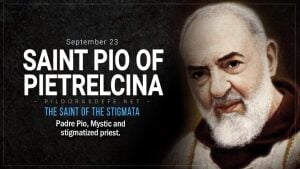
St. Pio of Pietrelcina. Mystic and stigmatized priest.
Padre Pio received the Stigmata and wore them for 50 years. St. Pio of Pietrelcina dedicated himself to Spiritual Direction and Confession. Biography
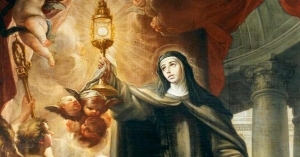
Saint Clare of Assisi. Disciple of St. Francis. Founder of the Poor Clares
St. Clare of Assisi was the founder of the Poor Clares. Her life was rich in works of charity. She was a disciple of St. Francis of Assisi
Biografía de Santos - Celebraciones y Fiestas de la Iglesia
 Qriswell Quero, Venezuelan, faithful husband and father of a family. Electronic engineer and missionary of the faith. Committed to the proclamation of the Gospel. Solid believer that there are always new beginnings. Whoever has God has nothing to stop him.
Qriswell Quero, Venezuelan, faithful husband and father of a family. Electronic engineer and missionary of the faith. Committed to the proclamation of the Gospel. Solid believer that there are always new beginnings. Whoever has God has nothing to stop him.